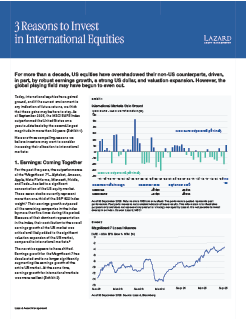Summary
While US equities have overshadowed their non-US counterparts for years, some of the long-standing drivers that supported this outperformance may be shifting. These are the three reasons we believe investors may want to pay attention to international equities:
- Relative earnings growth has improved for international markets.
- International currencies have strengthened relative to the US dollar.
- Valuations for non-US companies remain extremely attractive relative to those in the United States.
For more than a decade, US equities have overshadowed their non-US counterparts, driven, in part, by robust earnings growth, a strong US dollar, and valuation expansion. However, the global playing field may have begun to even out.
Today, international equities have gained ground, and if the current environment is any indication of future returns, we think that these gains may be here to stay. As of September 2025, the MSCI EAFE Index outperformed the United States on a year-to-date basis by the second-largest magnitude in more than 30 years (Exhibit 1).
EXHIBIT 1
International Markets Gain Ground
As of 30 September 2025. Returns since 1969 are annualized.
The performance quoted represents past performance. Past performance is not a reliable indicator of future results. This information is for illustrative purposes only and does not represent any product or strategy managed by Lazard. It is not possible to invest directly in an index.
Source: Lazard, MSCI
Here are three compelling reasons we believe investors may want to consider increasing their allocation to international markets:
1. Earnings: Coming Together
For the past five years, the outperformance of the “Magnificent 7”—Alphabet, Amazon, Apple, Meta Platforms, Microsoft, Nvidia, and Tesla—has led to a significant concentration of the US equity market. These seven stocks currently represent more than one-third of the S&P 500 Index weight.1 Their earnings growth outpaced all the remaining companies in the index by more than five times during this period. Because of their dominant representation in the index, their contribution to the overall earnings growth of the US market was critical and likely added to the significant valuation expansion of the US market, compared to international markets.2
The narrative appears to have shifted. Earnings growth for the Magnificent 7 has decelerated and is no longer significantly augmenting the earnings growth of the entire US market. At the same time, earnings growth for international markets was more resilient (Exhibit 2).
EXHIBIT 2
Magnificent 7 Loses Influence
As of 30 September 2025.
Source: Lazard, Bloomberg
At the start of this year, 2025 earnings growth in the United States was expected to be close to 13% compared to international at 7%. Now, consensus calls for a much narrower differential in earnings growth between the United States and international.3
In Europe, a big push of fiscal stimulus could accelerate growth and lift GDP. For example, Germany, with much less debt than the United States relative to the size of its economy, plans to inject €500 billion (about $575 billion) into its economy. At the same time, defense spending across Europe is dramatically increasing, along with plans for infrastructure development. In Japan, companies continue to work to improve financial productivity and are becoming more shareholder focused, prioritizing better allocation of capital, which could potentially drive return on equity and, likely, earnings higher.
2. Currency: The Weight of Change
Until recently, US dollar strength bolstered domestic markets while creating headwinds for international equities. Despite strong stock returns over the past five years for the MSCI EAFE Index in local currency terms,4 performance was less impressive when converted to US dollars.
But the story may be changing (Exhibit 3). The US dollar has declined due, in part, to US policy uncertainty and tariff concerns. At the same time, plans for more aggressive fiscal stimulus in Europe are likely energizing international currencies, which appear to be building a position of strength.
EXHIBIT 3
International Currencies Strengthening Relative to the US Dollar
As of 30 September 2025
Source: Lazard, FactSet, MSCI
3. Valuations: A Compelling Opportunity
Despite the outperformance of international equities year to date in 2025, valuations remain discounted when compared to the United States. As the impact of the Magnificent 7 on the overall earnings for the US market has diminished, so could some of the valuation differential.
Return on capital historically has been somewhat higher for US companies than international. This, too, contributed to higher valuations for US companies. Today, the trade-off between the return on capital and valuation for international stocks compared to those in the United States is the best it has been in more than 15 years.5 As many big drivers of relative outperformance for the United States have shifted, we believe this large discount could continue to support international market returns (Exhibit 4).
EXHIBIT 4
International Discount Is Appealing vs. US Stocks
As of 30 September 2025.
Source: Lazard, FactSet
Why International Now
We believe international equities are poised to make gains as some of the drivers contributing to the US stock lead are tempering. At the same time, we believe the relative valuations for international companies remain extraordinarily compelling compared to the United States, while government policy initiatives outside the US appear increasingly beneficial too.
Download PDF

3 Reasons to Invest in International Equities
Featured
Notes
1. Source: Lazard, Bloomberg, FactSet, S&P; As of 31 September 2025.
2. Source: Lazard, Bloomberg, FactSet, MSCI, S&P; As of 31 December 2024.
3. Source: FactSet; As of 30 September 2025.
4. Source: Lazard, FactSet, MSCI; As of 31 December 2024.
5. Source: Lazard, FactSet, MSCI, S&P; As of 30 September 2025.
Important Information
Published on 24 November 2025
The performance quoted represents past performance. Past performance is not a reliable indicator of future results.
Information and opinions presented have been obtained or derived from sources believed by Lazard Asset Management LLC or its affiliates (“Lazard”) to be reliable. Lazard makes no representation as to their accuracy or completeness. All opinions expressed herein are as of the published date and are subject to change.
Equity securities will fluctuate in price; the value of your investment will thus fluctuate, and this may result in a loss. Securities in certain non-domestic countries may be less liquid, more volatile, and less subject to governmental supervision than in one’s home market. The value of these securities may be affected by changes in currency rates, application of a country’s specific tax laws, changes in government administration, and economic and monetary policy.
Allocations and security selection are subject to change.
Mention of these securities should not be considered a recommendation or solicitation to purchase or sell the securities. It should not be assumed that any investment in these securities was, or will prove to be, profitable, or that the investment decisions we make in the future will be profitable or equal to the investment performance of securities referenced herein. There is no assurance that any securities referenced herein are currently held in the portfolio or that securities sold have not been repurchased. The securities mentioned may not represent the entire portfolio.
No risk management technique or process can guarantee return or eliminate risk in any market environment.
The S&P 500 Index is a market capitalization-weighted index of 500 companies in leading industries of the US economy.
The MSCI EAFE Index (Europe, Australasia, Far East) is a free-float-adjusted market capitalization index that is designed to measure developed market equity performance, consisting of developed market country indices excluding the United States and Canada.
The MSCI World Index is a free-float-adjusted market capitalization index that is designed to measure global developed market equity performance comprised of developed market country indices.
The MSCI USA Index is designed to measure the performance of the large and mid-cap segments of the US market.
The MSCI Emerging Markets Index is a free-float-adjusted market capitalization index that is designed to measure equity market performance in the global emerging markets. The MSCI Emerging Markets Index consists of emerging markets country indices including: Brazil, Chile, China, Colombia, Czech Republic, Egypt, Greece, Hungary, India, Indonesia, Korea, Malaysia, Mexico, Peru, Philippines, Poland, Qatar, Saudi Arabia, South Africa, Taiwan, Thailand, Turkey, and United Arab Emirates.
The MSCI All Country World Index (ACWI) is a free-float-adjusted market capitalization weighted index that is designed to measure the equity market performance of developed and emerging markets.
The MSCI Europe Index is a free-float-adjusted market capitalization index that is designed to measure equity market performance in the developed markets countries of Europe.
The MSCI Japan Index is a free-float-adjusted market capitalization index that is designed to measure equity market performance in Japan.
The U.S. Dollar Index is an index of the value of the United States dollar relative to a basket of foreign currencies, often referred to as a basket of U.S. trade partners' currencies. The Index goes up when the U.S. dollar gains "strength" when compared to other currencies.
These indices are unmanaged and have no fees. One cannot invest directly in an index.
Certain information included herein is derived by Lazard in part from an MSCI index or indices (the “Index Data”). However, MSCI has not reviewed this product or report, and does not endorse or express any opinion regarding this product or report or any analysis or other information contained herein or the author or source of any such information or analysis. MSCI makes no express or implied warranties or representations and shall have no liability whatsoever with respect to any Index Data or data derived therefrom.
Certain information contained herein constitutes “forward-looking statements” which can be identified by the use of forward-looking terminology such as “may,” “will,” “should,” “expect,” “anticipate,” “target,” “intent,” “continue,” or “believe,” or the negatives thereof or other variations thereon or comparable terminology. Due to various risks and uncertainties, actual events may differ materially from those reflected or contemplated in such forward-looking statements.
This document reflects the views of Lazard Asset Management LLC, Lazard Frères Gestion or its affiliates ("Lazard") based upon information believed to be reliable as of the publication date. There is no guarantee that any forecast or opinion will be realized. This document is provided by Lazard for informational purposes only. Nothing herein constitutes investment advice or a recommendation relating to any security, commodity, derivative, investment management service, or investment product. Investments in securities, derivatives, and commodities involve risk, will fluctuate in price, and may result in losses. Certain assets held in Lazard’s investment portfolios, in particular alternative investment portfolios, can involve high degrees of risk and volatility when compared to other assets. Similarly, certain assets held in Lazard’s investment portfolios may trade in less liquid or efficient markets, which can affect investment performance. Past performance does not guarantee future results. The views expressed herein are subject to change, and may differ from the views of other Lazard investment professionals.
This document is intended only for persons residing in jurisdictions where its distribution or availability is consistent with local laws and Lazard’s local regulatory authorizations. Please visit www.lazardassetmanagement.com/global-disclosure for the specific Lazard entities that have issued this document and the scope of their authorized activities.



